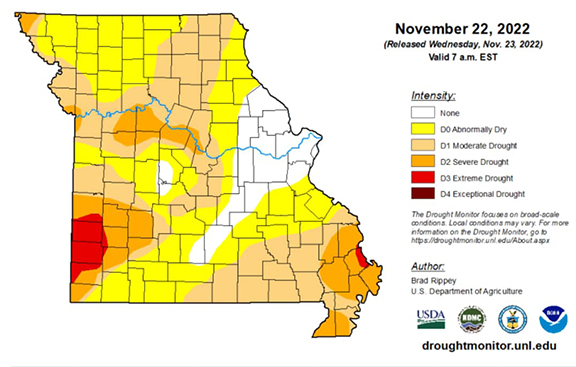JEFFERSON CITY – Governor Mike Parson today issued Executive Order 22-07 extending Missouri’s drought alert until March 1, 2023, to address issues outlined by the state’s Drought Assessment Committee.

Currently 87 percent of Missouri continues to face abnormally dry conditions, with many counties still experiencing moderate, severe, or extreme drought. Drought conditions are not expected to substantially improve this winter.
“It will take a lot of precipitation to help Missouri recover from the current water deficit,” Governor Parson said. “Water for livestock is just as important in the winter as it is the summer, and we want to ensure resources are available to our farmers and ranchers that may need them. Additionally, with navigational challenges forming on Missouri’s rivers affecting barge traffic, extending our Executive Order is necessary to support continued mitigation efforts.”
On July 21, Governor Parson issued an Executive Order declaring a drought alert for 53 counties hardest hit by drought conditions. While conditions have improved marginally since that time, drought has continued to create challenges for our Missouri citizens.
In response to Governor Parson’s initial Executive Order on this matter, the Missouri Department of Natural Resources activated the Drought Assessment Committee, a workgroup set up to assess drought levels and work with impact teams on response and recovery recommendations. The Agriculture Impact Team was assembled in August to coordinate response actions for the state’s agricultural community that has been impacted throughout this drought.
In addition, following the most recent Drought Assessment Committee meeting, the Commercial Navigation Impact Team is being convened as well because low flow levels on the Missouri and Mississippi rivers are making it difficult for commercial navigators, such as barges, to maneuver through the rivers.
The July Executive Order was set to expire on December 1. Extending it will allow the Drought Assessment Committee and associated impact teams to continue supporting affected communities throughout the winter and continue to expand the state’s capabilities to respond to and lessen the impacts of future droughts.
Citizens can submit information about local drought conditions at Condition Monitoring Observer Reports (CMOR).

